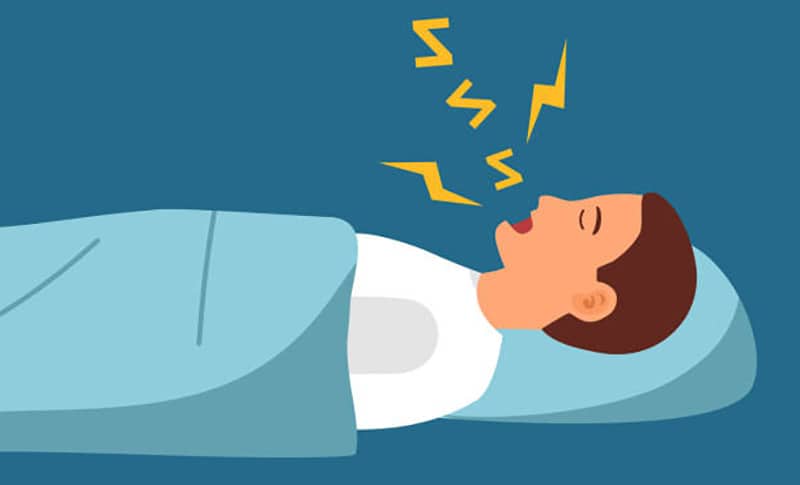Snoring is a common problem for both men and women. If you suffer from sleep apnea or other breathing problems, you may be at risk for high blood pressure, heart disease, stroke, diabetes, depression, anxiety, memory loss, and even death.
Learn more about the causes of snoring and how to treat it.
The Reasons Why You Are Snoring
Snoring occurs when air passes through the soft tissue in your throat during sleep. This makes your tongue fall back into your throat, causing vibrations that vibrate your vocal cords and cause them to collapse.
The vibration also affects the muscles around your nose, mouth, and jaw, causing those tissues to relax and open wider. As a result, your airway becomes narrower, and your air passages become blocked.
There are several reasons why you might snore. Some of these include:
- Sleep Apnea – When you breathe in, your airways narrow, preventing enough oxygen from entering your lungs. Your brain then senses this lack of oxygen and wakes you up. In some cases, this cycle repeats itself throughout the night.
- Obesity – Fatty deposits in your neck and upper chest can block your airways.
- Alcohol consumption – Drinking alcohol before bedtime can make you sleepy, but it can also affect your ability to breathe properly.
- Smoking – Nicotine constricts your airways, making it harder to breathe while you're asleep.
- Medications – Certain medications can increase your risk of snoring. These include antihistamines, muscle relaxants, antidepressants, and sedatives.
- Stress – Anxiety and stress can contribute to snoring because they cause your body to release adrenaline, which increases your heart rate and blood pressure.
- Other medical conditions – Conditions such as acid reflux, sinusitis, enlarged tonsils, and nasal polyps can all lead to snoring.
- Age – Older people tend to have stiffer necks and throats than younger adults. They also often experience arthritis-related pain in their jaws and shoulders.
How To Stop Snoring Immediately And Easily?
If you suspect that you have an underlying condition that's causing your snoring, talk with your doctor. He or she will conduct tests to determine whether there's anything medically wrong with you.
If you don't think that you have any underlying health issues, try using one of these methods to help reduce your snoring.
1) Avoid Alcohol Before Bedtime
Alcohol can cause your airways to close off, making it difficult to breathe. It also tends to make you drowsy, so you'll probably find yourself falling asleep if you drink too much.
2) Reduce Your Weight
Being overweight puts extra strain on your neck and throat, increasing the likelihood of snoring.
You should lose weight gradually, however, since rapid weight loss can actually trigger obstructive sleep apnea.
Talk with your doctor if you'd like him or her to recommend a diet plan for you.
3) Use A Nasal Spray
A nasal spray containing decongestants can temporarily relieve congestion in your nose and throat. Decongestants work by relaxing the muscles in your nose and throat, allowing them to expand and widen.
4) Try Using An Over-The-Counter Product
An over-the-counter product called Breathe Right is designed to treat symptoms of snoring. It contains a combination of ingredients that includes caffeine, guaifenesin (an expectorant), and xylitol (a sugar substitute).
5) Consider Surgery
In rare cases, surgery may be necessary to correct severe snoring problems. If you've been diagnosed with sleep apnea, your doctor might suggest having your tonsils and adenoids removed.
This procedure reduces the size of your tongue and soft palate, reducing the amount of tissue that blocks your airway during sleep.
6) Get Some Exercise
Exercise has many benefits, including improving your overall fitness level and helping you maintain a healthy weight. Regular exercise can also improve your posture, which could prevent your upper airway from collapsing when you fall asleep.
7) Keep Your Tongue Dry
To keep your mouth dry, avoid drinking liquids before bedtime. Also, brush your teeth immediately after eating, and use dental floss at least once per day.
8) Don't Eat Too Late At Night
Eating late at night makes it more likely that you'll wake up feeling tired and groggy. In addition, food that remains in your stomach overnight tends to ferment, leading to gas and bloating.
9) Watch What You Drink
Drinking alcohol can dehydrate you, leaving you thirsty and tired. It can also increase your risk of developing obesity, diabetes, and high blood pressure.
10) Avoid Caffeine
Coffee and other caffeinated beverages contain stimulants that can interfere with your ability to get restful sleep. They can also contribute to insomnia, irritability, anxiety, and poor concentration.
11) Limit Your Snack Time
Snacking between meals can lead to overeating later in the evening. Instead, eat small portions throughout the day.
12) Quit Smoking
It has been proven that smokers have more difficulty getting quality sleep than non-smokers do. Smoking cigarettes increases the chances of snoring because it narrows your air passages. Quitting smoking will also lower your risk of heart disease and stroke.
13) Manage Stress
Stress can affect your body's normal functions, including digestion, breathing, and sleeping. To manage stress effectively, try these tips:
- Take time out every day to relax.
- Practice deep breathing exercises.
- Engage in physical activity.
14) Make Sure You're Getting Enough Sleep
Sleep deprivation affects your mood and energy levels, making it harder to concentrate and perform daily activities. Aim for 7-8 hours of uninterrupted sleep each night.
15) Use The Bedroom For Rest And Relaxation Only
Your bedroom should be a place where you feel comfortable and relaxed. Turn off all electronics, such as TVs, computers, and smartphones, so they don't distract you while you sleep.
16) Try A Pillow That Fits Properly
A pillow that doesn't fit properly can cause neck pain or headaches, especially if you lie on your back. Look for pillows that are firm enough to support your head but not too hard.
17) Consider Using An Eye Mask
An eye mask is designed to block light from entering your eyes, which can disrupt your natural circadian rhythm.
18) Choose A Mattress With Good Support
A mattress that provides good support can help ease muscle tension and promote relaxation.
19) Be Aware Of Your Sleeping Position
If you tend to toss and turn while sleeping, then consider using an adjustable bed instead of a traditional one. These beds allow you to adjust your position without waking up.
20) Adjust Your Temperature
You may find that adjusting your room temperature helps you fall asleep faster. However, make sure that you don't set your thermostat too low since this can actually cause you to stay awake longer.
Recommended Products That May Help You Stop Snoring
Snoring can be caused by a number of factors, including your age and genetics. If you are experiencing snoring problems, it's important to find the best products that help stop snoring.
Here are some of the most effective options available today.
1) CPAP Machine
CPAP machines work by blowing pressurized air into your nose, preventing air from flowing through your throat. This prevents the vibration of soft tissues in your throat from causing noise during sleep. They are typically used to treat obstructive sleep apnea (OSA), but they can also be helpful for treating milder cases of snoring.
2) Oral Appliances
These devices use a special mouthpiece to keep your tongue away from your airway. Some models even vibrate to prevent your jaw muscles from clenching.
3) Tongue Splints
Tongue splints are custom-made pieces of plastic that attach to your teeth and hold your tongue in place. They are often worn overnight while you sleep.
4) Other Options
Other treatment methods include:
- Anti-snore strips
- Nasal sprays
- Herbal remedies
These products may significantly help reduce snoring, but they aren't always effective. Talk with your doctor before trying any new product.
Overcome Snoring Through Diet
Snoring is a common problem that affects many people. It can be caused by various factors, including obesity and other health problems.
However, it can also be caused by an underlying condition called obstructive sleep apnea (OSA). This condition occurs when your upper airways become blocked during sleep. As a result, you will experience loud snores and shallow breathing.
The good news is that there are several ways to overcome snoring through diet. Here are some tips that can help you do so:
Eat More Fiber
Fiber is found in fruits and vegetables. It can help improve digestion and prevent constipation. You should aim to eat at least 25 grams of fiber each day.
Reduce Sugar Intake
Sugar causes inflammation in your body. This can lead to weight gain and other health issues. Try to limit your sugar intake as much as possible.
Drink Plenty of Water
Drinking plenty of water throughout the day can help keep your throat moist. This can prevent snoring.
Avoid Alcohol
Alcohol can affect your ability to breathe properly. Therefore, if you have been drinking alcohol, try to cut back on how much you consume.
Limit Your Salt Intake
Salt makes your blood salty. When this happens, it can cause swelling in your nasal passages. As a result, your airways can narrow, making it more likely that you will snore.
If none of these options work, talk with your doctor about getting a sleep study done.
A sleep study uses sensors placed on your chest and abdomen to monitor your breathing patterns and movements. The results will give your doctor information about whether or not you suffer from OSA.
Final Words
The best way to stop snoring is to find the cause of your snoring. If you have a deviated septum, then it may be causing your snoring.
A deviated septum is when the cartilage that separates your nostrils isn't straight. This can make it difficult for you to breathe properly.
Your doctor can correct this issue using a procedure known as a septoplasty. Afterward, you won't need to worry about snoring anymore.
If you don't have a deviated septa, then you might want to consider having your tonsils removed. Tonsillectomy can remove excess tissue and allow you to breathe more easily.
Another option is to wear a nasal strip or oral appliance. These devices can prevent your tongue from blocking your airway.
Finally, you could talk to your dentist about getting dental implants. Dental implants are small titanium posts that go inside your gums.
When your jawbone grows around them, they provide support for your teeth. This makes it easier for you to bite down on food without feeling pain.


